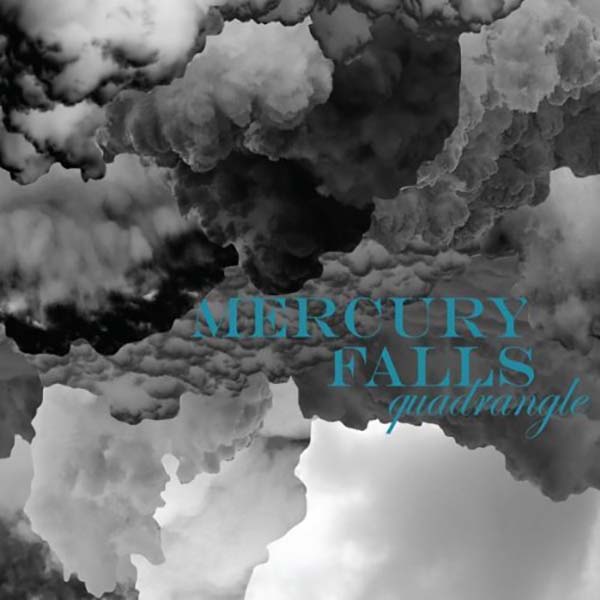
by Ian Mann
September 01, 2010
/ ALBUM
The music of Mercury Falls has a quiet strength that may well appeal to some curious rock listeners and, in the UK at least, to the Late Junction audience.
Mercury Falls
“Quadrangle”
(Porto Franco Records PFR019)
Mercury Falls is a quartet from the San Francisco area co-led by guitarist Ryan Francesconi and reeds player Patrick Cress. The group is completed by bassist Eric Perney and drummer Tim Bulkley. “Quadrangle”, released on the independent San Francisco label Porto Franco Records represents the band’s recorded début although both Francesconi and Cress have worked extensively with other artists across the jazz, pop and classical genres, most notably Francesconi’s role as guitarist in Joanna Newsom’s band.
Quadrangle” features seven compositions by the co-leaders written either jointly or individually and the music reflects their various interests. Francesconi brings a pop and folk sensibility and a degree of subtle electronica with Cress’ contributions more rooted in the world of “indie jazz”. The band cite improvising jazz pianist Craig Taborn, classical composer Bela Bartok and alt rock bands Tortoise and Stereolab as influences. It’s an eclectic mix and one that is reflected in the band’s music. Listening to Mercury Falls it’s immediately apparent just how “European” their music sounds. In an “Invisible Jukebox” situation I certainly wouldn’t have picked them out as being American. The accompanying press release states “it’s as if Manfred Eicher’s ECM Records landed in the San Francisco Bay Area and inhaled the progressive musical bent of the city”. Well, I don’t know about that, but I do hear echoes of British progressive rock and elements of the kind of contemporary jazz purveyed by the UK group Polar Bear or some of the bands from the thriving Norwegian “jazztronica” scene.
Much of “Quadrangle” is highly impressionistic, which I guess is where the ECM comparison comes in. This is typified by the opening “Spring Pools”, jointly written by the co-leaders, which builds from ambient beginnings, all brooding sax and guitar/electronica backwash, through something more groove orientated as Bulkley’s shuffling hip hop beats are added to the mix. The wordless singing of guest vocalist Michelle Amador adds yet another texture to this deeply layered, cinematic piece.
Francesconi’s “Speak Without Ears” combines the composer’s joint loves of folk music forms and electronica. Song like in construction and notable for the way Francesconi sets his acoustic playing among the electronic elements the piece maintains the fragile, pictorial mood set by its predecessor.
The chemistry between the two co-leaders, despite their seeming to come from different musical directions, is expressed in their careful arrangements and the manner in which neither gets in the other’s way. With Perney and Bulkley adding suitably sympathetic support this is a tightly controlled and disciplined band despite the often ethereal nature of their music.
Another joint composition “Quad Idea” uses Cress’ repeated baritone sax phrase as a hook as the other members of the band plus his own overdubbed alto sax extemporise around it. Wordless vocals, this time by Barry Syska soar above it all before the group take a sideways step and introduce a more ambient, guitar led second section. Taken as a whole the piece retains the dream like atmosphere previously established.
The group’s ambient tendencies come in the main from Francesconi and his brooding, shimmering “Years Without Speech” takes this approach further still. Atmosphere and texture are everything on this haunting duet between Cress’ reeds and Francesconi’s guitars, the latter veering between the purely acoustic and the subtly treated. The title is perhaps a mirror of the earlier “Speak Without Ears”.
Jointly written, “Insurance Rep” is unexpectedly moving with Cress appearing convincingly on bass clarinet. Francesconi supplies the by now obligatory ambient textures but it’s the delicately and gently propulsive drumming of Bulkley that forms the other outstanding performance here.
Cress’ “Solar Plexus” begins with an air of quiet menace before building insistently to produce the most full on, rock influenced playing on the album, culminating in a highly distorted solo from Francesconi. It makes for a welcome change in dynamics and the album might have benefited from the presence of at least one more track in this vein.
Also by Cress the closing “Lullaby For Beane” returns to the gently brooding ambience of much of the rest of the album. “Ambience” is not a word the band particularly cares for, they prefer to describe much of their music as “quiet”, but it does give some idea of where Mercury Falls are coming from. Not that this is “musique concrete” in any way, the compositions are too melodic and well defined for that but “ambient” does give some idea of the mood the band are trying to create.
When I first heard “Quadrangle” I found it rather insipid and initially viewed it as having rather more style than substance. However repeated listenings have revealed hidden depths and I’ve rather grown to like its distinctive and unusual atmosphere. There’s virtually no orthodox jazz playing or rhythms here and purists may scoff, but the music of Mercury Falls has a quiet strength that may well appeal to some curious rock listeners and, in the UK at least, to the Late Junction audience.
This is an unusual band and clearly one with a good deal of potential. Greater dynamic and stylistic variation may benefit them next time out and their future progress will be watched with interest.
blog comments powered by Disqus